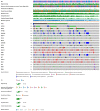Immune Resistance in Lung Adenocarcinoma
- PMID: 33494181
- PMCID: PMC7864325
- DOI: 10.3390/cancers13030384
Immune Resistance in Lung Adenocarcinoma
Abstract
Lung cancer is the leading cancer killer worldwide, imposing grievous challenges for patients and clinicians. The incidence of lung adenocarcinoma (LUAD), the main histologic subtype of lung cancer, is still increasing in current-, ex-, and even non-smokers, whereas its five-year survival rate is approximately 15% as the vast majority of patients usually present with advanced disease at the time of diagnosis. The generation of novel drugs targeting key disease driver mutations has created optimism for the treatment of LUAD, but, as these mutations are not universal, this therapeutic line benefits only a subset of patients. More recently, the advent of targeted immunotherapies and their documented clinical efficacy in many different cancers, including LUAD, have started to change cancer management. Immunotherapies have been developed in order to overcome the cancer's ability to develop mechanisms of immune resistance, i.e., to adapt to and evade the host inflammatory and immune responses. Identifying a cancer's immune resistance mechanisms will likely advance the development of personalized immunotherapies. This review examines the key pathways of immune resistance at play in LUAD and explores therapeutic strategies which can unleash potent antitumor immune responses and significantly improve therapeutic efficacy, quality of life, and survival in LUAD.
Keywords: immune resistance; immunotherapy; lung adenocarcinoma; non-small cell lung cancer; targeted therapies.
Conflict of interest statement
The authors declare no conflict of interest. The funders had no role in the writing of the manuscript.
Figures


References
Publication types
Grants and funding
- 1853/General Secretariat for Research and Technology
- Graduate College (Graduiertenkolleg, GRK) #2338/Deutsche Forschungsgemeinschaft
- target validation project for pharmaceutical development ALTERNATIVE/German Ministry for Education and Research (Bundesministerium für Bildung und Forschung, BMBF)
- Translational Research Grant/German Center for Lung Research (Deutsches Zentrum für Lungenforschung, DZL)
LinkOut - more resources
Full Text Sources
Other Literature Sources

